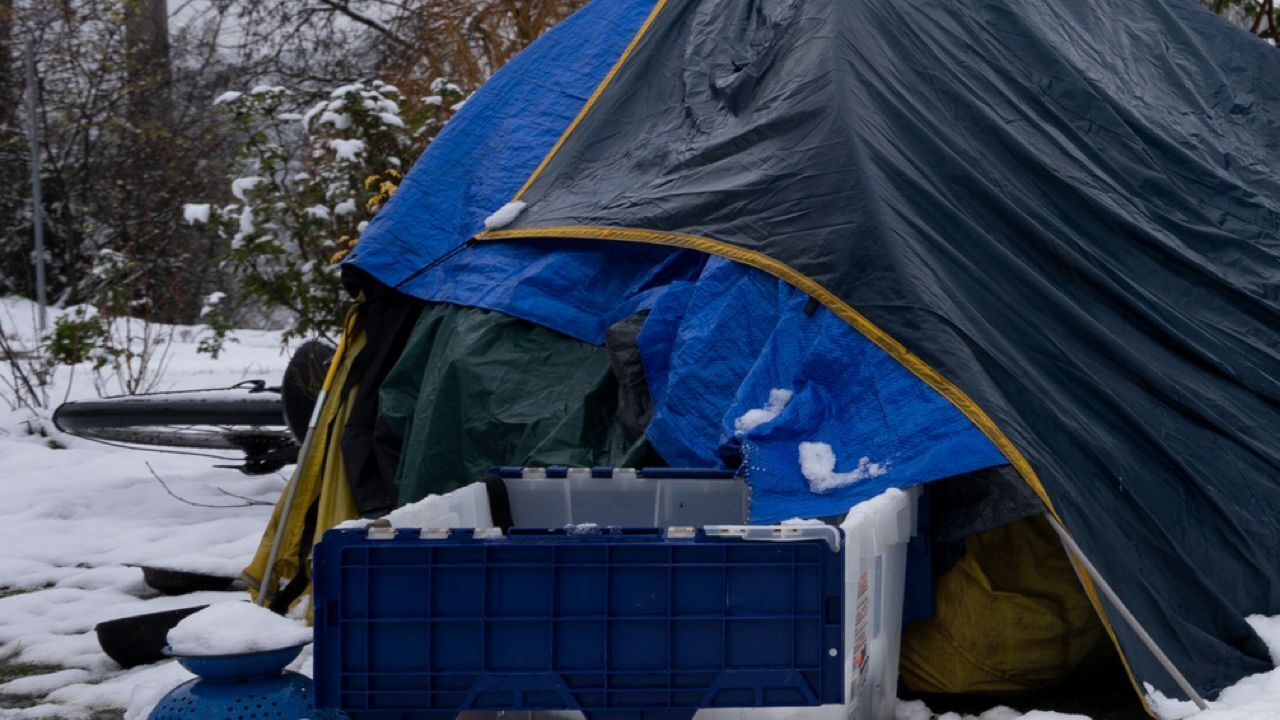
As housing and homelessness crisis’s continue to affect communities across Canada, a recent report presented by a group in Peel Region on unhoused individuals, cited lack of deeply affordable housing, emergency shelter overflows and overcrowding, and limited options for people who feel unsafe in emergency shelters, as reasons for living outdoors. About three-quarters (73%) of 179 respondents identified the need for a safe place to stay and spend the night.
Peel Poverty Action Group (PPAG), a community grassroots group advocating to resolve issues surrounding poverty and homelessness in Peel Region, commissioned a needs-based assessment of unhoused people living out-of-doors in the winter of 2022 to get researched data on the growing encampment situation in Mississauga, Brampton and Caledon.
PPAG developed a qualitative survey to capture a snapshot of participants’ experiences living in encampments. The survey revealed the environment where participants lived, the causes behind their current living situation, and what would help them obtain and retain permanent housing.
The study and report analysed and written Hub Solutions, a social enterprise of the Canadian Observatory of Homelessness, reflected the sentiments of 179 individuals who were struggling to survive outside, primarily in conditions that are not fit for human habitation.
Quote
[We need] a restructured social services system. In order to be stable, I need a job and if someone chooses to employ me despite my appearance, my inability to provide contact information, my lack of transportation or [my] inability to feed myself and take care of myself; if despite ALL of those factors I get a job, welfare will take 50% of it, and then my rent will take 30% of it which will continue to entrap me in survival. If I get hurt [or] lose my job or take out a load or get a fine or get a ticket, [it] will cause me to lose everything and start back from the street waiting on another miracle. It's so vicious.”- Survey participant.
The report was presented to municipal government representatives including councillors and mayors for Mississauga, Brampton and Caledon on March 23, 2023, at the Peel Regional Council. Peel community members and advocates Michelle Bilek, Catherine Soplet and Sara Pinto, the latter, who spoke about her own lived experience, delegated before council on the need for more community collaboration, a Housing First approach to ending homelessness and the need to address gaps within the system. “Nothing has changed – in fact we see that conditions have worsened,” said long-time PPAG member Michelle Bilek.”
Key Demographic Findings
- Among the 179 survey participants, the majority 72% identified as men. Most participants (30%) were between 35 and 44 years old. The largest proportion of women were between the ages of 25 to 44 (32%), while the largest proportion of men were over the age of 55 (16%)
- Slightly more than half of the participants (54%) were situated in Brampton, followed by Mississauga (36%) and Malton (4%). About half (52%) of respondents had spent their nights in multiple locations, which often changed over time.
- As of the time of the survey, participants were living in a range of locations not meant for habitation, including parks, streets and alleyways, building surroundings such as staircases, storefronts, and accessible rooftops, forests, bus and train stations and parking lots, under the bridge and campsite tents.
Causes for Homelessness
- A large number of participants (42%) mentioned that they could not afford housing for themselves and their families.
- About one-quarter (27%) of respondents shared that they were removed from their previous housing either by family and friends or as a result of eviction.
- Just under half (41%) of respondents shared that the onset of increased physical, mental health, and substance use challenges when experiencing homelessness, often in combination, contributed to their continued unsheltered housing status.
Participant perspective on better living conditions
- Access to fulfillment of essential needs: In addition to access to a safe structure, participants would benefit from meeting essential needs, such as food, clothing, warm clothing to survive winter, washrooms, showers, hygiene products, heating, and medication.
- Participants mentioned affordable housing options, financial stability, wrap-around care, and advocacy as some of the core supports that they need to obtain and maintain permanent housing.
Subsequent to the Report, but an issue raised with Region of Peel Councils, was PPAG’s identification that the impact of digital inequity for unhoused people was not explicitly captured in the survey. Peel Region is one of three Ontario pilot sites for the digital Transformation of Social Assistance, which assumes those in need of human services have a digital device, connection and know-how to reach supports from caseworkers and employment Ontario service providers.
The report came with a series of recommendations that included investing in Housing First programs and review of emergency shelter policies in Peel, as well as service provision based on age, gender and cultural needs. The needs-based report was shared with the Federal Housing Advocate’s Office, who is currently conducting a review on encampments across Canada.
-30-
Media Requests:
Daphna Nussbaum
Peel Alliance to End Homelessness
[email protected]
647-461-1383
Source: Story.KISSPR.com
Release ID: 574302

